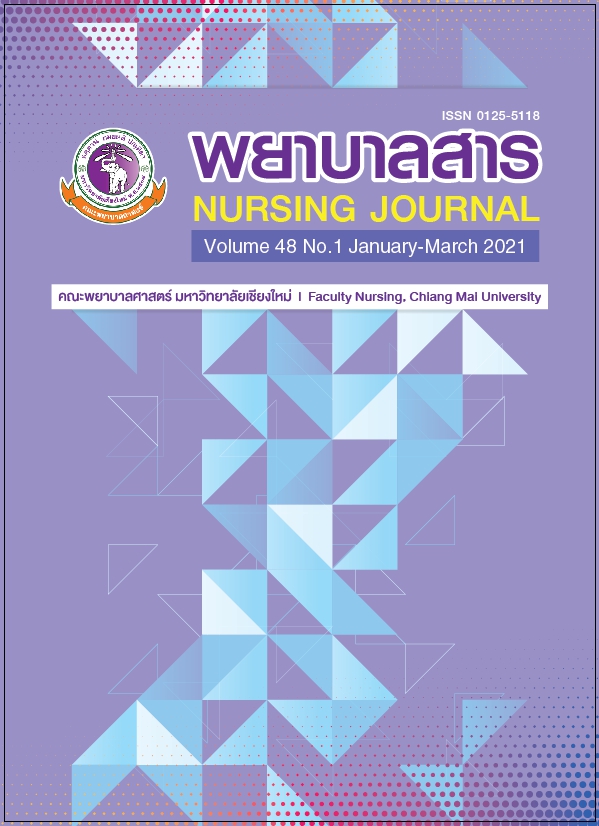Social Support, Uncertainty, and Coping Among Women with Preterm Labor
Keywords:
Social support, uncertainty, coping, women with preterm laborAbstract
Pregnant women with preterm labor will confront several types of stress. Helping them to cope with this stress is an important role of the nurse-midwife. The purpose of this descriptive correlational research study was to explore the relationships among social support, uncertainty, and coping among women with preterm labor. The participants were 85 pregnant women with preterm labor, chosen through the inclusion criteria, who admitted to the labor room of Sakonnakhon Hospital between July and December 2017. The research tools were the Uncertainty in Situation Questionnaire, based on the Uncertainty in Illness concept by Mishel (1997) and the Thai version by Phojanart (2013), the Social Support Questionnaire, and the Coping for at Risk Pregnant Women Questionnaire as developed by Chunpradub (1995). Data were analyzed using descriptive statistics and Pearson’s product moment correlation coefficient.
The results of the study were as follows:
- Participants demonstrated overall coping at a high level (= 92.56, S.D. = 7.89)
- Social support was positively statistically significant correlated with coping among women with preterm labor (r = .58, p < .01).
- Uncertainty in situations was negatively statistically significant correlated with coping among women with preterm labor (r = -.54, p < .01).
The findings from this study can be used as baseline data for planning effective nursing care to promote coping among pregnant women with preterm labor.
References
Chunpradub, P. (1995). The Relationship between self-esteem, social support and coping behavior in high-risk pregnant women. (Master thesis in maternal and child nursing), Graduate School, Mahidol University. (In Thai)
Cunningham, F. G., Leveno, K. J., Bloom, S. L., Spong, C. Y., Dashe, J. S., Hoffman, B. L., … Sheffield, J. S. (2014). Williams obstetrics (24th ed.). New York: McGraw-Hill.
Giurgescu, C., Penckofer, S., Maurer, M. C., & Bryant, F. B. (2006). Impact of uncertainty, social support, and prenatal coping on the psychological well-being of high-risk pregnant women. Nursing Research, 55(5), 356-365.
Guardino, C. M., & Schetter, C. D. (2014). Coping during pregnancy: A systematic review and recommendations. Health Psychology Review, 8(1), 70-94.
Hamilton, J. G., & Lobel, M. (2008). Types, patterns, and predictors of coping with stress during pregnancy: Examination of the revised prenatal coping inventory in a diverse sample. Journal of Psychosomatic Obstetrics & Gynecology, 29(2), 97-104.
House, J. S. (1981). Work stress and social support. New Jersey: Prentice-Hall.
Jittrapirom, A., Chareonsanti, J., & Sriarporn, P. (2014). Pregnancy risk perception, uncertainty, and stress among gestational diabetic women. Nursing Journal, 41(1), 50-61. (In Thai).
Lazarus, R.S., & Folkman, S. (1984). Stress appraisal and coping. New York: Springer.
Lyman, L. E., & Miller, M. A. (1992). Mother’s and nurse’s perception of the need of women experiencing preterm labor. Journal of Obstetric Gynecology, and Neonatal Nursing, 21(2), 126-136.
Maloni, J. A. (2010). Antepartum bed rest for pregnancy complications: Efficacy and safety for preventing preterm birth. Biological Research for Nursing, 12(2), 106-124. doi:10.1177/1099800410375978
Mishel, M. H. (1981). The measurement of uncertainty in illness. Nursing Research, 30, 258-263.
Mishel, M. H. (1988). Uncertainty in illness. Image: Journal of Nursing Scholarship, 20(4), 225-232.
Mishel, M. H. (1990). Reconceptualization of the uncertainty in illness theory. Image: Journal of Nursing Scholarship, 22, 256-262.
Mishel, M. H. (1997). Uncertainty in acute illness. Annual Review of Nursing Research, 15(1), 57-80.
Pochanart, A., Wonghongkul, T., & Sukonthason, A. (2013). Effect of supportive - educative nursing system on uncertainty in illness among newly diagnosed breast cancer patients. Nursing Journal, 40(3), 75-84. (In Thai)
Rubarth, L. B., Schoening, A. M., Cosimano, A., & Sandhurst, H. (2012). Women's experience of hospitalized bed rest during high-risk pregnancy. Journal of Obstetric Gynecologic and Neonatal Nursing, 41(3), 398-407. doi:10.1111/j.1552-6909.2012 01349.xA
Simhan, H. M. (2016). Practice bulletin number 159, January 2016: Management of preterm labor. Obstetrics & Gynecology, 127(1), 29-38.
Thoits, P. A. (1982). Conceptual, methodological, and theoretical problems in studying social support as a buffer against life stress. Journal of Health and Social Behavior, 23, 145-149.
White, M., & Ritchie, J. (1984). Psychological stressors in antepartum hospitalization: Reports from pregnant women. Maternal-Child Nursing Journal, 13(1), 47-56.
Yali, A. M., & Lobel, M. (1999). Coping and distress in pregnancy: An investigation of medically high-risk women. Journal of Psychosomatic Obstetrics & Gynecology, 20, 39-52. doi: 10.3109/01674829909075575
Downloads
Published
How to Cite
Issue
Section
License
บทความที่ได้รับการตีพิมพ์เป็นลิขสิทธิ์ของวารสารพยาบาลสาร
ข้อความที่ปรากฏในบทความแต่ละเรื่องในวารสารวิชาการเล่มนี้เป็นความคิดเห็นส่วนตัวของผู้เขียนแต่ละท่านไม่เกี่ยวข้องกับมหาวิทยาลัยเชียงใหม่ และคณาจารย์ท่านอื่นๆในมหาวิทยาลัยฯ แต่อย่างใด ความรับผิดชอบองค์ประกอบทั้งหมดของบทความแต่ละเรื่องเป็นของผู้เขียนแต่ละท่าน หากมีความผิดพลาดใด ๆ ผู้เขียนแต่ละท่านจะรับผิดชอบบทความของตนเองแต่ผู้เดียว






